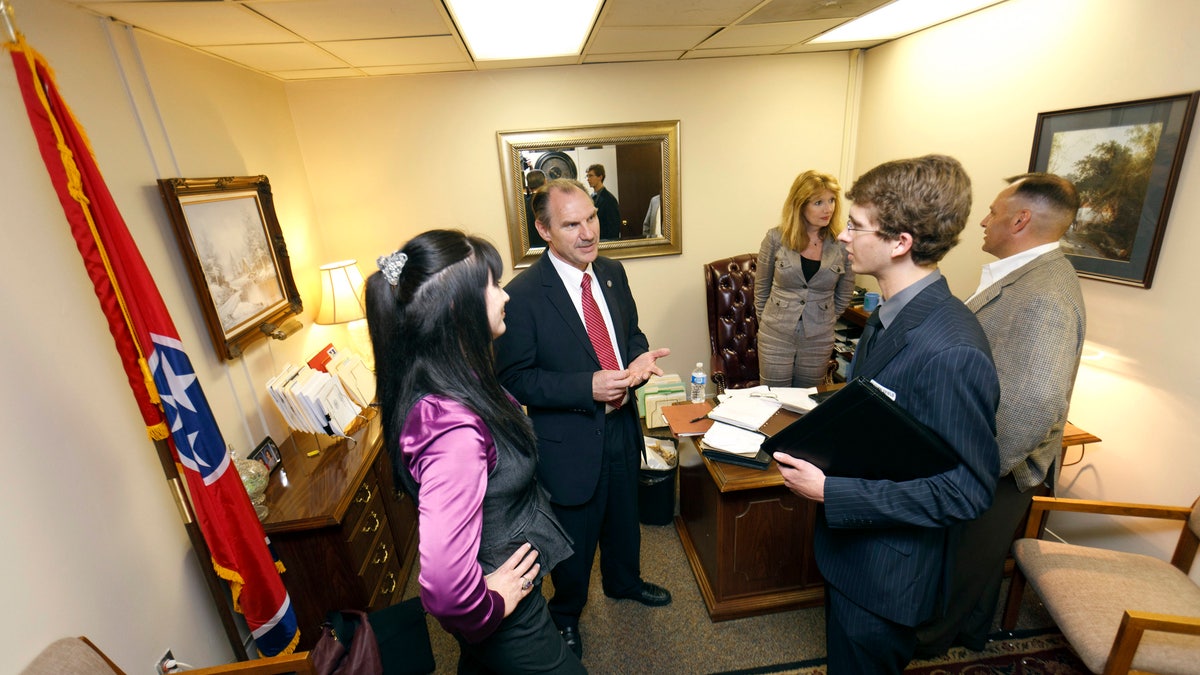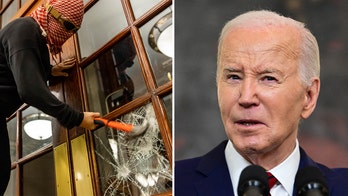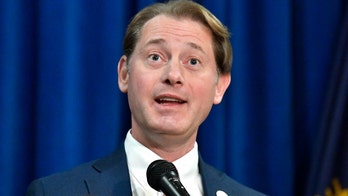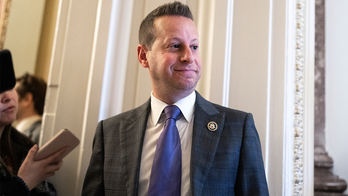
FILE: April 4, 2012: Members of the Tea Party and Young Republicans at Tennessee Technological University meet with Rep. Mark Pody in his office in Nashville, Tenn. (REUTERS)
TAMPA, Fla. – The Romney campaign is trying to dip into the ranks of the youth voters who helped President Obama win in 2008 – focusing on those recent college grads perhaps living in their parents' basement or mowing lawns to cover a student loan.
Though the Obama campaign four years ago won over hundreds of thousands of new, mostly college-aged voters, the slow economic recovery has left roughly 50 percent of recent graduates either unemployed or underemployed.
Republicans are hoping to reach out to those disaffected voters by arguing their prospects will improve under GOP presidential nominee Mitt Romney, who started an equity firm that -- despite the controversy surrounding it -- created private-sector jobs.
GOP vice presidential nominee Paul Ryan on Wednesday night made what was perhaps the most direct and descriptive pitch yet to younger voters.
“College graduates should not have to live out their 20s in their childhood bedrooms, staring up at fading Obama posters and wondering when they can move out and get going with life,” he said during his speech at the Republican National Convention. At the same time, Ryan stressed the cool factor, noting his personal playlist includes AC/DC and Led Zeppelin.
So can the GOP ticket make the sell?
Students at The University of Tampa, just steps from the Republican convention, expressed mixed thoughts about Romney’s chances of winning more of the youth vote this week.
“People wanted to be part of history in 2008,” said Matt Rutkovitz, a senior and student government president at the university. “People were jumping out of their seats. … I don’t see the get-out-the-college vote this year."
Rutkovitz, from suburban Baltimore, said he will vote for Romney in large part because both of his parents are small-business owners and Romney offers the best change to foster the entrepreneurial spirit in which he was raised.
Standing near a voter-registration table inside a campus building, 21-year-old Nicole Whalen, a senior from Pennsylvania, said she will vote for Obama because her mother receives Medicare and Social Security and she believes Obama's Medicare plan best preserves her benefits.
“My mom wouldn’t survive without them,” she said.
Earlier this week, the Romney campaign reminded young voters about their supposedly bleak economic prospects with a release titled “Youth & The Obama Economy” that in part states a record 5.9 million young adults are living with their parents and the average cost of tuition and fees at a four-year state school have increased by 25 percent since 2008.
Last week, Romney told attendees of a town hall-style event at St. Anselem College, in New Hampshire, that half of new college graduates cannot get a job consistent with their degree.
“Unacceptable,” he said before quoting former Texas GOP congressman Dick Armey who recently said, “The American Dream used to be owning your own home. Now it's getting your kids out of the home you own.”
Romney is locked in a close race with Obama that could be decided by how well he is able to cut into the president’s hold on such voting blocs as independent and college-aged voters.
About 49 percent of young voters -- 18 to 24 years old -- voted in 2008, compared with 47 percent in 2004 and an historical rate of about 40 percent.
Though the enthusiasm that help elect the country’s first black president and the first Democratic president in eight years appears lower this year, questions remain about whether a Republican can win that vote.
“There is a misconception that Republicans don’t care about the youth vote,” Republican strategist Tyler Harber said Thursday. “This couldn’t be further from the truth.”
He acknowledges young voters have leaned Democratic in the last several presidential contests, but he also points out they made up at least 10 percent of the national electorate in 2008 and are “not a population that Team Romney can simply ignore.”
Harber, a partner in the Washington-based Harcom Strategies, also thinks Republicans have an edge this election cycle in part because young voters also are concerned about changes to federal college-loan programs and have the “realization that the social safety net afforded to previous generations will simply not be available.”
Meanwhile, Obama is trying recapture some of that 2008 energy by visiting campuses across the county, including a three-stop, college-town swing this week.
“They’ll tell you that if you believed in change four years ago that you were foolish,” the president said Tuesday at Iowa State University. “They hope you’ll be discouraged and stay away (from the polls) this time.”




